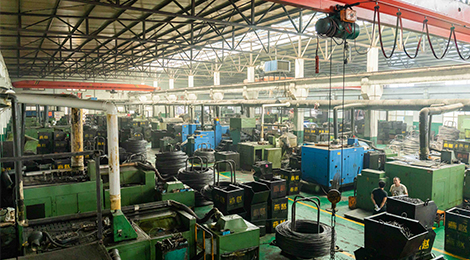Exploring Popular Mild Steel Stud Bolts for Various Applications and Their Benefits
Nov . 27, 2024 04:01 Back to list
Exploring Popular Mild Steel Stud Bolts for Various Applications and Their Benefits
The Significance of Mild Steel Stud Bolts in Construction and Engineering
Mild steel stud bolts play a crucial role in various applications within construction and engineering. These components are essential for ensuring the stability and reliability of structures, machinery, and various equipment. Understanding their features, benefits, and applications can help engineers and constructors make informed decisions when selecting materials for their projects.
What Are Mild Steel Stud Bolts?
Mild steel stud bolts are fasteners made from mild steel, which is known for its ductility, malleability, and weldability. Unlike high-strength bolts, mild steel stud bolts are not heat-treated, making them easier to manufacture and work with. They are generally threaded across their entire length or have a specific length of threads on either end, allowing them to be anchored securely into components with nuts. This feature makes them particularly effective in applications requiring a tight and reliable hold.
Advantages of Mild Steel Stud Bolts
One of the primary advantages of mild steel stud bolts is their impressive strength-to-weight ratio. Although they do not have the same tensile strength as high-strength steel bolts, they are sufficiently robust for many applications, particularly in construction. Mild steel’s inherent flexibility allows it to absorb shocks and vibrations better than more brittle materials, making it ideal for dynamic environments.
Moreover, mild steel is readily available and cost-effective. This accessibility makes it a go-to choice for many construction projects, especially when large quantities of fasteners are required. The ease of fabrication allows for custom lengths and diameters to suit specific applications, providing versatility in use.
Additionally, mild steel stud bolts can be galvanized or coated to enhance their resistance to corrosion. Coating processes, such as hot-dip galvanizing or applying protective paints, extend the lifespan of these fasteners, making them suitable for outdoor and high-humidity environments.
famous mild steel stud bolt

Applications of Mild Steel Stud Bolts
Mild steel stud bolts are extensively used in various sectors, including construction, automotive, and manufacturing. In the construction industry, they are commonly found in structural assemblies, including beams, columns, and frames where they provide the necessary fastening capability to ensure structural integrity.
In the automotive sector, mild steel stud bolts are used in assembling engine components, chassis, and bodywork. Their ability to withstand the rigors of mechanical loads and vibrations makes them an ideal choice for these applications.
Furthermore, in machinery and equipment manufacturing, mild steel stud bolts are utilized to secure parts and components, aiding in the overall functionality and safety of machines. Whether it’s for creating machinery foundations, securing panels, or fastening critical components, they play a vital role in machinery longevity and performance.
Conclusion
In conclusion, mild steel stud bolts are indispensable components in modern construction and engineering. Their favorable properties, such as ease of fabrication, good corrosion resistance, and sufficient strength, make them an ideal choice for various applications. As the demand for reliable and cost-effective fastening solutions grows, the use of mild steel stud bolts will continue to be relevant in the industry. Understanding the characteristics and benefits of these fasteners can lead to better design practices and more efficient construction processes.
By focusing on the advantages that mild steel stud bolts offer—from cost-efficiency to adaptability in diverse environments—engineers and manufacturers can ensure that their projects not only meet current standards but also contribute to the innovation and sustainability of future engineering solutions.
Latest news
-
High-Quality Panel Stud Bolt Reliable Panel Stud Bolt Factory & Suppliers
NewsJul.08,2025
-
High-Precision Fine Thread Locknuts Manufacturer & Supplier Custom Solutions
NewsJul.08,2025
-
PH Imperial Stud Bolt – High Strength Fasteners from Leading Supplier & Factory
NewsJul.07,2025
-
High-Quality Allen Wrench Bolts Leading Factory, Company & Suppliers
NewsJul.07,2025
-
Wholesale Ball Stud Bolt - High Quality Supplier & Factory Price Reliable Wholesale Ball Stud Bolt Company
NewsJul.06,2025
-
High-Strength Alloy Bolts Manufacturer & Supplier Quality Alloy Fasteners Factory
NewsJul.06,2025
